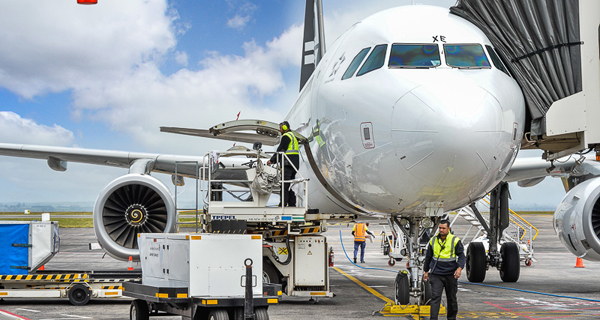Airfreight Exporters Association-Ghana has called on the government to as a matter of priority acquire cargo planes for the country to facilitate non-traditional exports.
According to the Association, the over-dependency on passenger flights is having a serious effect on exporting time-sensitive and perishable goods as most flights fail to airlift their goods despite booking in advance.
The situation has worsened this time due to the combined effect of flight challenges due to the Covid-19 pandemic.
This ugly situation is causing huge losses by exporters of fresh /processed fruits and vegetables as their goods are rotting at Ghana’s Kotoka International Airport.
President of the Airfreight Exporters Association-Ghana Albert Atua Amponsah tells Starr news “The airport now has issues of overbooking of flight, there is no space for some of our products to get to their destinations and we are dealing with perishable goods and these perishable goods after harvesting can last for 48 hours and it should get to the next stage of delivery. It should move from our port and then in the next 6 or 8 hours, it should get to Europe. Because most of our flights are passenger flights, our goods are to be on standby for longer hours, so our goods are crowded at the port” said Albert Atua Amponsah
Albert Atua Amponsah added “The main cause is the non-availability of the aircraft to transport the produce to the next stage of destinations but we will also say that the Christmas holidays is one of the problems because a lot of people are traveling now, therefore, the goods are on standby making it difficult to export it”
He continued “The covid pandemic has had a bigger challenge on the activities of these airlines in Ghana because there was a ban on aircraft coming to Ghana and even after lifting the ban some of the airlines are finding it difficult to come on board causing destruction in the supply chain”
The President of the Airfreight Exporters Association-Ghana lamented that the cold room facility for temporal preservation of the perishables was full due to inadequate flights to export their goods.
“The cold room facility at the port is full and overstressed. So the goods that do not have access are rotting away. So we want to appeal to government and the various stakeholders to come to our aid because it will really go to have an effect on our foreign exchange and most importantly job creation”.
He said to address this chronic challenge facing the non-traditional export sector, the government must acquire cargo planes to facilitate the export of perishables from Ghana at “cheaper shipping cost/freight charges and safe timely delivery”.
Last year, Ghana out-doored the National Export Development Strategy (NEDS) which envisages that in the next 10 years, Non-Traditional Exports (NTEs) will grow to $25.3 billion from current earnings of $2.9billion and this has been the case in the last 5 years growing at an average rate of 2.97%.
The current earnings represent 18% of the total national merchandise exports of Ghana as of 2019.
Ghana is one of Africa’s top exporters of perishables, with agricultural products making up a third of the country’s total exports, and cocoa beans and fruit the lion’s share.
According to President of the Airfreight Exporters Association-Ghana Albert Atua Amponsah, the non-traditional export sector has the potential to make Ghana “export-led industrialized economy, create jobs, drive in more foreign exchange receipts, strengthen our Cedi, create wealth, increase tax revenue and improve rural livelihood”.
He, therefore, called on the government to expand holding cold rooms at the ports and employ skilled technical terminal ground handlers to handle fresh produce to meet the standard.
Albert Atua Amponsah also urged for a compensation regime from airline operators when their negligence leads to losses.
The Association also appealed for “availability and timely credit facility to Exporters with low-interest rates while the government supports and Strengthen the capacity of the value chain actors of the Fresh Produce Export sector” to help meet the national target is contained in the national export strategy therein.
Source: Mybrytnewsroom.com/Obed Ansah


















































